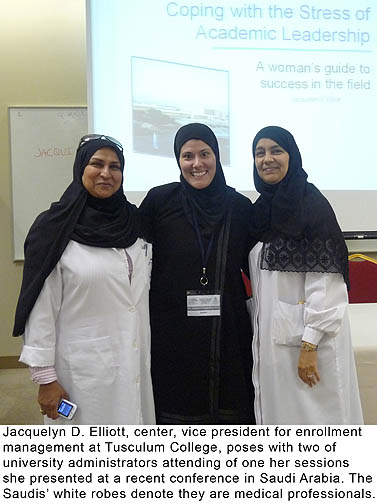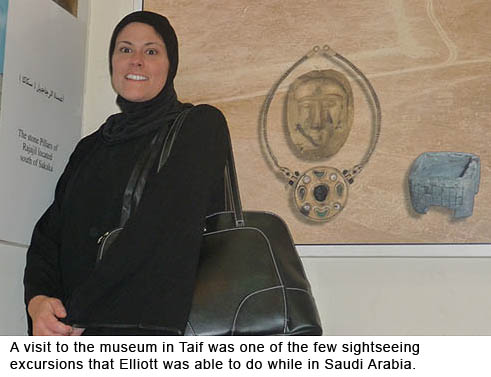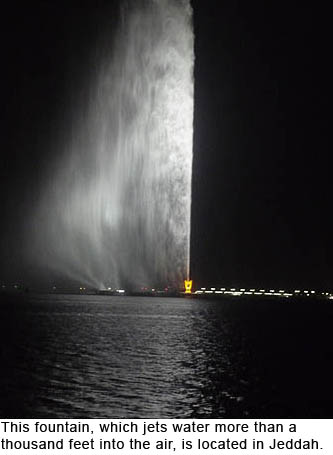 Jacquelyn D. Elliott, vice president for enrollment management, recently returned from a whirlwind trip to Saudi Arabia where she was one of four American presenters at conferences for various universities over a four-day period.
Jacquelyn D. Elliott, vice president for enrollment management, recently returned from a whirlwind trip to Saudi Arabia where she was one of four American presenters at conferences for various universities over a four-day period.
Elliott was selected to be a presenter at “The Essential Academic Leader II” a conference sponsored by the Saudi Arabia Ministry of Higher Education and the Academic Leadership Center, which is under the auspices of King Fahd University of Petroleum and Minerals.
The Academic Leadership Center was formed to help build a high level of quality academic leadership in Saudi Arabian universities. The Middle Eastern country has experienced rapid growth in higher education in the past decade with the creation of new schools as well as expansion of existing universities.
The stateside equivalent to the Academic Leadership Center is the American Council on Education. “One reason that I may have been selected to be a presenter is the work I have done with the American Council on Education’s Office on Women in Higher Education,” Elliott said.
The group of four was led by Dr. Jeffrey L. Buller, dean of the Harriet L. Wilkes Honors College at Florida Atlantic University. The group also included Dr. Jacqueline Fewkes, assistant professor of anthropology at the Wilkes Honors College at Florida Atlantic, and Dr. Timothy Hatfield, professor of counselor education at Winona University.
On their first day in Saudi Arabia, May 15, all four participated in a Discussion Forum on the Academic Leadership Center Roadmap. Following keynote addresses, Fewkes and Elliott served as facilitators in a breakout sessions in discussions about what the center’s future role should be and what programs and services it should provide.
At the forum, Elliott had the opportunity to meet the Saudi Minister of Education and the Princess of Saudi Arabia, Dr. Aljoharah Fahad M. Al-Saud, who is the rector of Princess Nor Bint Abdulrahman University. A rector’s position corresponds to that of a president of an American college or university.
The forum took place in Riyadh and would be the last time the group of four would be together during the trip. The men went to one set of universities for conferences for Saudi male higher education administrators, and the women presented at conferences for Saudi female academic leaders.
Elliott and Fewkes traveled to Jeddah for a two-day conference at King Abdul Aziz University on May 16 and 17. On May 18, Elliott was in Taif for the Taif University conference that was held at the local Awaliv Hotel. Elliott’s last destination was a conference at Umm Al-Qura University in Mecca on May 19.
The four presentations that Elliott made dealt with various issues faced by academic leaders. One was about effective communication in academic leadership. Another was called “Lifescripts: A Personal Approach to Office Success” that focused on such topics as mediation, conflict resolution and difficult human resource issues.
A third was called “Leading Change in Higher Education: Creating Energy through Strategic Planning and Goal Mapping.” And a fourth was called “Coping with the Stress of Academic Leadership.”
The presentations included an overview by Elliott on each topic and breakout sessions that allowed the attendees to work together as teams on projects and planning for their own institutions. A translator and interpreter accompanied Elliott for a few of the sessions to translate her presentations into Arabic and help convey her English meanings into a corresponding Arabic word or idea.
The Saudis were receptive to what she presented, Elliott said, and she has been contacted by some of the attendees since she has returned home. Mentoring of new leaders by experienced leaders is a concept being encouraged by the Academic Leadership Center, and Elliott has been asked by a Saudi administrator in enrollment to be her mentor. She is also working with another Saudi administrator to write an article for journal publication.
 A packed schedule of presentations and travel did not leave much time for Elliott to sightsee during the trip, but she learned much about the Saudi culture through her experiences in the conferences and from the attendees.
A packed schedule of presentations and travel did not leave much time for Elliott to sightsee during the trip, but she learned much about the Saudi culture through her experiences in the conferences and from the attendees.
A difference between Saudi and American is evident in the photos that Elliott brought back from the conference. Throughout their time in Saudia Arabia, Elliott and Fewkes dressed in hijab and abayas, the traditional long loose-fitting outer garment and head coverings required to be worn by all women, even in the 110-plus degree weather they experienced while there.
They also had to be accompanied by a male chaperone in public, Dr. Yasser Fallatah. He also coordinated their driver since women are not allowed to drive in Saudi Arabia, the only country in the world that does not permit the practice.
The prominence of the Islamic religion in the fabric of daily life in Saudi Arabia was evident during the presentations. Elliott said the attendees would refer to their religion often, saying, “Our prophet Mohammed.,. peace be upon him said …” in discussions of an issue.
The women were eager to talk about their beliefs with Elliott, telling her that Christianity and Islam share many of the same teachings about how to treat others. The Saudi women also wanted Elliott to know they were different than a common western perception that all Muslims are like the small minority of extremists.
The Saudis were warm and gracious people, Elliott said, and told her that they in turn, found Americans to be a warm and friendly people.
Elliott said she found Saudi Arabia to be a more conservative culture than the other Islamic countries she has visited in the past such at Turkey and Egypt. She noted that the city of Jeddah is considered to be “progressive ” in Saudi Arabia as women there are known to walk and exercise in public while wearing their traditional dress.
 Saudi Arabia is also a country of varying geographical regions. She traveled from the seaside to the mountainous region around Taif, which is world famous for their roses.
Saudi Arabia is also a country of varying geographical regions. She traveled from the seaside to the mountainous region around Taif, which is world famous for their roses.
During their trip, the presenters stayed in comfortable hotels, she said, and the “food was amazing.” There was much fresh fruit and vegetables and for breakfast, they were treated to honey still dripping from its honeycomb.
The comfortable accommodations were a plus in the busy days. The women’s days began at around 5:30 a.m. to eat breakfast and prepare for the day before leaving to travel to the conference site. The conferences lasted from 8:30 until around 2:30 p.m., when they took a break for lunch with the attendees. Around 3:30 p.m. they traveled back to the hotel to pack and then travel to the next destination. Elliott recalled that they would arrive at their next destination in later evening, and their hosts would take them out to see the town for a few hours.
With the tight schedule, there was some time to sightsee as they were able to visit the Taif Museum after-hours and visited the world’s largest fountain at Jeddah.


